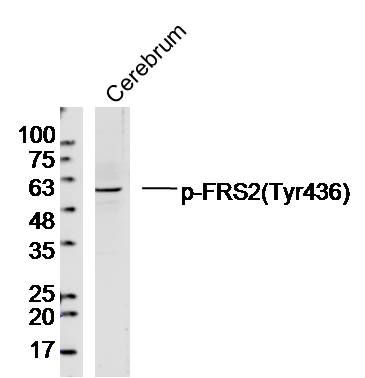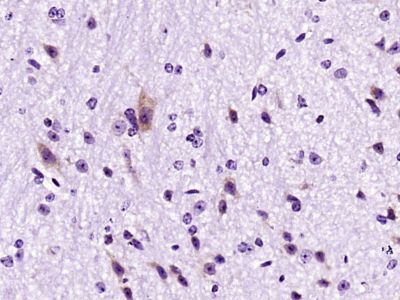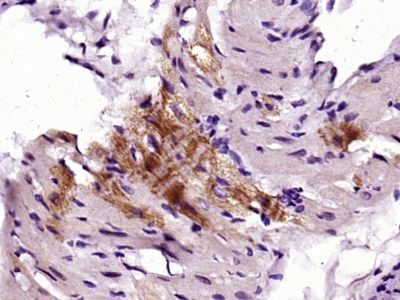
磷酸化成纤维细胞生长因子受体底物2抗体
产品名称: 磷酸化成纤维细胞生长因子受体底物2抗体
英文名称: phospho-FRS2(Tyr436)
产品编号: hz-7902R
产品价格: null
产品产地: 中国/上海
品牌商标: HZbscience
更新时间: 2023-08-17T10:24:20
使用范围: WB=1:500-2000 ELISA=1:500-1000 IHC-P=1:400-800 IHC-F=1:400-800 IF=1:100-500
上海沪震实业有限公司
- 联系人 : 鲍丽雯
- 地址 : 上海市闵行区闵北路88弄1-30号第22幢AQ136室
- 邮编 : 200612
- 所在区域 : 上海
- 电话 : 139****0749 点击查看
- 传真 : 点击查看
- 邮箱 : www.shzbio.net
- 二维码 : 点击查看
Rabbit Anti-phospho-FRS2(Tyr436) antibody
| 产品编号 | hz-7902R |
| 英文名称 | phospho-FRS2(Tyr436) |
| 中文名称 | 磷酸化成纤维细胞生长因子受体底物2抗体 |
| 别 名 | p-FRS2(Tyr436); phospho-FRS2(Y436); FRS2(phospho-Y436); FRS2(phospho-Tyr436); p-FRS2(Y436); FGFR signaling adaptor SNT; FGFR signalling adaptor; FGFR substrate 2; FGFR-signaling adaptor SNT; Fibroblast Growth Factor Receptor Substrate 2; FRS 2; FRS2_HUMAN; FRS2A; FRS2alpha; SNT 1; SNT; SNT-1; SNT1; Suc 1 Associated Neurotrophic Factor Target; Suc1 associated neurotrophic factor target 1; Suc1-associated neurotrophic factor target 1. |
| 产品类型 | 磷酸化抗体 |
| 研究领域 | 细胞生物 信号转导 生长因子 激酶和磷酸酶 细胞膜受体 |
| 抗体来源 | Rabbit |
| 克隆类型 | Polyclonal |
| 交叉反应 | Human, Mouse, Rat, Dog, Pig, Cow, Horse, Rabbit, |
| 产品应用 | WB=1:500-2000 ELISA=1:500-1000 IHC-P=1:400-800 IHC-F=1:400-800 IF=1:100-500 (石蜡切片需做抗原修复) not yet tested in other applications. optimal dilutions/concentrations should be determined by the end user. |
| 分 子 量 | 57kDa |
| 细胞定位 | 细胞浆 细胞膜 |
| 性 状 | Lyophilized or Liquid |
| 浓 度 | 1mg/ml |
| 免 疫 原 | KLH conjugated synthesised phosphopeptide derived from human FRS2 around the phosphorylation site of Tyr436:LN(p-Y)IQ |
| 亚 型 | IgG |
| 纯化方法 | affinity purified by Protein A |
| 储 存 液 | 0.01M TBS(pH7.4) with 1% BSA, 0.03% Proclin300 and 50% Glycerol. |
| 保存条件 | Store at -20 °C for one year. Avoid repeated freeze/thaw cycles. The lyophilized antibody is stable at room temperature for at least one month and for greater than a year when kept at -20°C. When reconstituted in sterile pH 7.4 0.01M PBS or diluent of antibody the antibody is stable for at least two weeks at 2-4 °C. |
| PubMed | PubMed |
| 产品介绍 | background: Adapter protein that links FGR and NGF receptors to downstream signaling pathways. Involved in the activation of MAP kinases. Modulates signaling via SHC1 by competing for a common binding site on NTRK1. Tissue specificity:Highly expressed in heart, brain, spleen, lung, liver, skeletal muscle, kidney and testis. Function: Adapter protein that links activated FGR and NGF receptors to downstream signaling pathways. Plays an important role in the activation of MAP kinases and in the phosphorylation of PIK3R1, the regulatory subunit of phosphatidylinositol 3-kinase, in response to ligand-mediated activation of FGFR1. Modulates signaling via SHC1 by competing for a common binding site on NTRK1. Subunit: Part of a complex containing FRS2, GRB2, GAB1, PIK3R1 and SOS1. Part of a complex containing GRB2 and CBL. Identified in a complex containing FGFR4, NCAM1, CDH2, PLCG1, FRS2, SRC, SHC1, GAP43 and CTTN. Binds RET (By similarity). Binds ALK, FGFR1, CKS2, MAPK1/ERK2, MAPK3/ERK1 and SRC. The tyrosine-phosphorylated protein binds the SH2 domains of GRB2 and PTPN11. Interacts with NTRK1, NTRK2 and NTRK3 (phosphorylated upon ligand-binding). Subcellular Location: Endomembrane system. Note=Cytoplasmic, membrane-bound. Tissue Specificity: Highly expressed in heart, brain, spleen, lung, liver, skeletal muscle, kidney and testis. Post-translational modifications: Phosphorylated by ULK2 in vitro (By similarity). Phosphorylated on tyrosine residues upon stimulation by NGF or FGF2. Phosphorylated on tyrosine residues by activated ALK and FGFR1. Phosphorylated on tyrosine residues upon activation of FGFR2 and FGFR3. Phosphorylated on threonine residues by MAP kinases; this inhibits tyrosine phosphorylation, and thereby down-regulates FRS2-mediated activation of MAP kinases. Ubiquitinated when tyrosine phosphorylated and in a complex with GRB2. The unphosphorylated form is not subject to ubiquitination (By similarity). Similarity: Contains 1 IRS-type PTB domain. SWISS: Q8WU20 Gene ID: 10818 Database links: Entrez Gene: 10818 Human Entrez Gene: 327826 Mouse Entrez Gene: 314850 Rat Omim: 607743 Human SwissProt: Q8WU20 Human SwissProt: Q8C180 Mouse Unigene: 593446 Human Unigene: 135965 Mouse Unigene: 22182 Rat Important Note: This product as supplied is intended for research use only, not for use in human, therapeutic or diagnostic applications. |
| 产品图片 |
 Sample: Cerebrum (Mouse) Lysate at 40 ug
Primary: Anti-p-FRS2(Tyr436) (bs-7902R) at 1/300 dilution Secondary: IRDye800CW Goat Anti-Rabbit IgG at 1/20000 dilution Predicted band size: 57 kD Observed band size: 57 kD Paraformaldehyde-fixed, paraffin embedded (Rat heart); Antigen retrieval by boiling in sodium citrate buffer (pH6.0) for 15min; Block endogenous peroxidase by 3% hydrogen peroxide for 20 minutes; Blocking buffer (normal goat serum) at 37°C for 30min; Antibody incubation with (phospho-FRS2(Tyr436)) Polyclonal Antibody, Unconjugated (bs-7902R) at 1:400 overnight at 4°C, followed by operating according to SP Kit(Rabbit) (sp-0023) instructionsand DAB staining.
 Paraformaldehyde-fixed, paraffin embedded (Rat brain); Antigen retrieval by boiling in sodium citrate buffer (pH6.0) for 15min; Block endogenous peroxidase by 3% hydrogen peroxide for 20 minutes; Blocking buffer (normal goat serum) at 37°C for 30min; Antibody incubation with (phospho-FRS2(Tyr436)) Polyclonal Antibody, Unconjugated (bs-7902R) at 1:400 overnight at 4°C, followed by operating according to SP Kit(Rabbit) (sp-0023) instructionsand DAB staining
|

